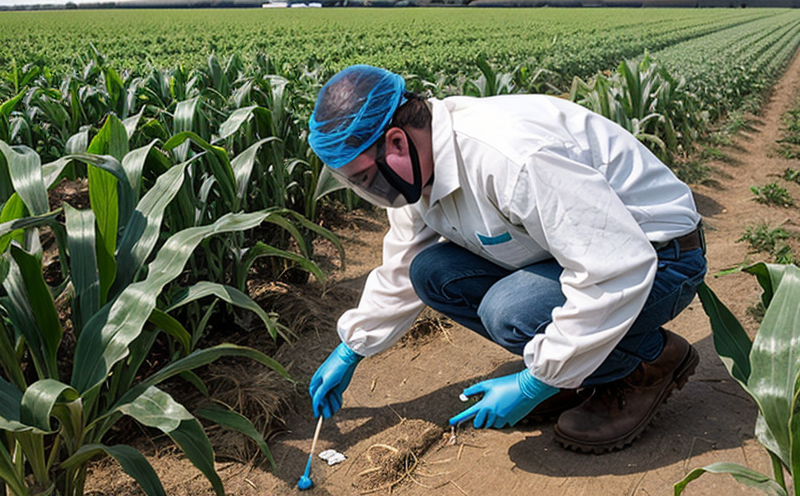Bifenthrin Residue Testing in Crops
Bifenthrin is a widely used synthetic pyrethroid pesticide that exhibits potent insecticidal properties. It is commonly applied to crops such as cotton, corn, and vegetables for pest control. Due to its effectiveness, bifenthrin can sometimes leave residues on harvested produce, necessitating stringent residue testing to ensure compliance with international standards.
Our laboratory specializes in the thorough analysis of bifenthrin residues in agricultural products using advanced analytical techniques such as Liquid Chromatography-Mass Spectrometry (LC-MS/MS). This method provides high sensitivity and selectivity, ensuring accurate quantification even at trace levels. Our team adheres strictly to international standards, including ISO 17025 for proficiency and accuracy.
For reliable testing, we require a minimum of one kilogram (kg) of the sample being tested. The specimen must be carefully prepared in accordance with our laboratory protocols, which involve drying, grinding, sieving, and extraction to ensure homogeneity. Our instrumentation includes state-of-the-art LC-MS/MS systems that allow for precise measurement of bifenthrin concentrations.
The testing process involves multiple steps: sample preparation, solvent extraction, purification, and finally, quantification through chromatography-mass spectrometry analysis. The results are reported in parts per million (ppm) or parts per billion (ppb), depending on the sensitivity required for the specific crop.
Our laboratory ensures that all tests comply with international guidelines, including the European Union's Maximum Residue Levels (MRLs) as specified in Annex I of Regulation EC No 396/2005. Compliance with these standards is crucial to protect public health and environmental safety while maintaining market access for agricultural products.
Our expertise extends beyond mere compliance; we also provide valuable insights into the impact of bifenthrin residues on both human health and the environment. This includes assessing potential risks associated with long-term exposure to these residues, as well as evaluating the ecological footprint of their use in agriculture.
International Acceptance and Recognition
Our bifenthrin residue testing service is recognized globally for its precision and reliability. We are accredited to perform tests according to international standards such as ISO/IEC 17025, which ensures that our methods meet the highest quality requirements. Our clients include multinational corporations, smallholder farmers, and government agencies from various regions.
The European Union's stringent regulations on pesticide residues have made compliance a priority for many agricultural producers worldwide. By offering accurate bifenthrin residue testing, we help them navigate these complex regulatory landscapes. Our service is also in demand due to increasing consumer awareness of food safety and environmental sustainability.
We maintain close relationships with international bodies such as the Food and Agriculture Organization (FAO) and World Health Organization (WHO), ensuring that our practices align with global best practices in agricultural testing. This recognition enhances our credibility among stakeholders, including regulatory authorities, buyers, and end consumers.
Environmental and Sustainability Contributions
- Eco-friendly Testing Methods: Our commitment to environmental sustainability is reflected in the use of advanced analytical techniques that minimize waste and energy consumption. By adhering to these eco-conscious practices, we contribute positively to reducing our carbon footprint.
- Support for Sustainable Agriculture: Through accurate residue testing, we assist farmers in optimizing pesticide application, thereby promoting sustainable agricultural practices. This not only reduces unnecessary chemical use but also enhances soil health and biodiversity.
- Risk Mitigation: By identifying and quantifying bifenthrin residues, we help reduce the risks associated with overuse or improper application of pesticides. This supports a more responsible approach to agricultural production that benefits both humans and the environment.
Competitive Advantage and Market Impact
In today's competitive global market, compliance with international standards is essential for maintaining market access. Our bifenthrin residue testing service provides a crucial edge by ensuring that clients meet all regulatory requirements. This not only protects their brand reputation but also facilitates smoother trade relationships.
By offering reliable and precise testing, we help our clients stay ahead of potential issues related to pesticide residues. This proactive approach ensures that they can confidently engage in international markets where compliance is critical for entry and continued business operations.
The ability to provide accurate residue data also enhances the credibility of agricultural products, potentially increasing market value and consumer trust. In an era where consumers are increasingly concerned about food safety and environmental impact, our service plays a pivotal role in addressing these concerns effectively.





